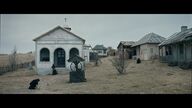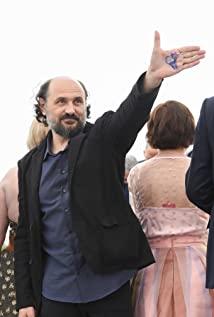The same line of dialogue and the same expression
can be seen from the background thoughts of the viewer, and different feelings can be seen.
Like the Bible, the same passage, the same source, the
world is full of ambiguity, and then differences lead to tragedy.
From the lens, you can clearly see every character, every movement, and the
picture does not divert your attention. From beginning to end, it honestly explains the current situation,
but its suspense, the key to how to read the whole story, is until the end. There is no conclusion,
even, the more I see, the more I can't grasp it.
In the end, after I understand the ins and outs of the incident, my vision is blurred,
just like the last mirror, the dirt stains the window in front of the car, right and
wrong no longer . So sure, no longer so clear.
The only certainty is that Voichita, who was hesitant and worried, finally gave up,
just like the blind man described in the Gospel of John, who was blind before but now sees.
about their relationship.
At the beginning of the reunion, Voichita seemed to have a sense of enthusiasm to avoid Alina.
Between the tracks, she asked Alina to "stay there", but she hugged her forward.
On the carriage, her eyes were deliberately averted, and then she made a prayer gesture with a cross. ,
Alina looks at Voichita firmly, it is inevitable, but what about Voichita's mind? Does
the coldness on the surface cover up the heat inside? When the
follow-up camera sees her shuttle among the crowd, it is because she minds the eyes of others Is it a hint? Did
Voichita choose a god, or did he use it as a refuge?
If he really no longer loves Alina, and now there is only concern among friends,
Or have they never been in love, just lived together
as childhood sweethearts, then again, is it Alina's wishful thinking, or did they not think about it?
Another scene, they sleep in the same bed, Voichita sings, then hugs Alina, and starts. weep.
Is it recalling the scenes that have been staged every night before?
Is it the fear of not knowing where to go from now on?
Is it the desire to mend the lost relationship, but cannot go back to that time
?
About God/Devil involvement.
Is there really a devil?
There is a long-shot deal like this,
Voichita got up in the middle of the night to sing and read the scriptures with another nun. The camera only shot their backs. On
the right side of the fixed mirror, Alina's lower body suddenly appeared.
In the typical plot observation of supernatural movies, both heroines can be regarded as possessed by spirits
because of the unusualness.
Voichita left the bed in the middle of the night for no reason, and is still reading some words that
are not very common in ghost movies. In the eyes of Alina, it is even more unbelievable.
Because I grew up together, I dare not I believe that my friend's life has changed so dramatically, and Kazaka
may also have a sense of mission to save her and leave the collective ignorance;
as for Alina's sudden appearance behind Voichita, it is a technique that is usually used by the thriller, and
she is strong and possessive all the time. , unstable emotional expression
(sometimes frosty, empty eyes, sometimes full of anger, full of jealousy),
in response to every attempt to rob Voichita, the people around him are
also common in Hollywood, possessed by ghosts changing situation.
Is there really a God?
Alina said, she believed, so she prayed day and night that Voichita would come back to her,
however, isn't this sincere prayer really fulfilled?
That "Shall We Go?" even if it came too late , Alina heard it after all.
Finally, it was proved that Voichita loved her more than her religious beliefs, right?
The transition of the dark field also gave endless imagination space.
Three times when Alina got out of control, and at the end of Alina's sobriety, Volchita wasn't there.
Volchita only heard from the other nuns each time,
"Her voice changed!" "She set fire!" "She knew us." !"
Like Volchita, the audience only heard rumors, but did not see the evidence that was true.
What was the cause of each accident? It was impossible to know, just like every time she was asked what happened to Alina, she only answered one question, the
audience did not know. It is more limited than Volchita's information. Because he is not on the scene and has not experienced Alina's past experience,
he can watch it more objectively and calmly, and feel more faithfully. Every character present is at a loss
. Can we have a better way to deal with it? Can we withstand the current public pressure?
Alina also left blank on the details of the priest's confession. What
she said is not important. What she didn't say may be the key.
, For Volchita, for believers, confession of sin can be forgiven, she ca n't
get peace, because she hides it, because she has not truly trusted God; There is no redemptive meaning.
about social groups.
The world is so big that there is no room for one person.
Whether it is a monastery, a hospital, or an orphanage, each has its own reasons.
The biggest problem is the lack of effective resource allocation.
Camelia's case outlines the reasons why the orphanage could not accommodate Alina, not only because of her
age, but also because of the rule that "if you leave, you can't go back", and
the most important thing is the consideration of money.
In the last episode, I first wrote about the poverty of the monastery, and in the next episode, I was connected to the orphanage of food aid,
and then the orphans who grew up wanted to find accommodation in the monastery.
Is that a disaster in a vicious circle, or a testimony of mutual help and love? There are
not enough hospital beds. The attending doctor suggested that the monastery take over Alina, which
reminded the proposition that patients are still sinners.
When Alina answered the doctor's question soberly,
the answer clearly pointed out that she had schizophrenia symptoms such as auditory hallucinations.
She was also discharged from the hospital because she did not need to stay for treatment, or because she did not want to be alone here?
Unusual behavior , is it sick or the evidence of guilt?
Later, in the adoptive parents' home, the dramatic conflict between staying and not staying was extended.
The adoptive mother in the picture has a worried expression, which corresponds to Alina's indifference to everything. Are the adoptive parents mean to
her? She was not accepted, and seeing her abnormal behavior, she felt inappropriate and unable to persuade her adoptive mother to blame it on the bad influence of the West. From Alina's point of view, her adoptive parents didn't want to take care of her at all, they just wanted to take advantage of her, Withholding and defrauding their money, and giving what belongs to others to others,
There is also a secret saying, there is no vacant room, is it helpless or an excuse?
The former brings out the grimness of the social economy, while the latter strengthens the hypocritical facade of the adoptive parents.
The camera never moves away, and it is not a subjective point of view.
The audience can only see the clues that have happened in the past . The
rich details in the background can also leave a footnote of reflection on the final tragedy.
Is it a social issue? Abandonment, or is it a spiritual/spiritual problem of only one person?
If God is with you, there is nothing to be afraid of.
A firm belief that is loud and clear, as the car drives all the way, slowly, without reason, dialing Chaos is no longer anyway. Looking at the indifference and desolation
of the scene in front of me, more absurd things happen every day,
what kind of world is this? Full text at: http://onethirdfilm.wordpress.com/2013/07/31/beyond-the-hills1/
View more about Beyond the Hills reviews










